
Quiz about old sayings
Difficulty : Medium-Easy Get 7/10 correct to pass the quiz
Question 1 of 10
"Every cloud has a silver _____."
Question 2 of 10
"All's well that _____ well."
Advertisement
Question 3 of 10
"Curiosity killed the _____."
Question 4 of 10
"Beggars can't be _____."
Question 5 of 10
"Charity begins at _____."
Question 6 of 10
"It takes one to _____ one."
Question 7 of 10
"Don't look a gift horse in the _____."
Advertisement
Question 8 of 10
"Half a loaf is better than _____."
Question 9 of 10
"If wishes were horses, beggars would _____."
Question 10 of 10
"Might makes _____."
Advertisement

MORE QUIZZES
General trivia quiz
10 questions
10 questions

General Knowledge For Trivia
How many of them will you answer correctly?
How many of them will you answer correctly?

Food Quiz For Home Cooks
10 mixed questions
10 mixed questions

World History Quiz
Tell us your result in the comments
Tell us your result in the comments

Trivia challenge
10 questions to battle
10 questions to battle

Quiz : Science and more
10 mixed trivia questions
10 mixed trivia questions
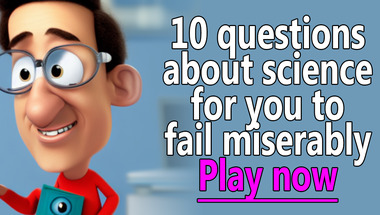
Brain test : 10 trivia quest
Are you ready?
Are you ready?
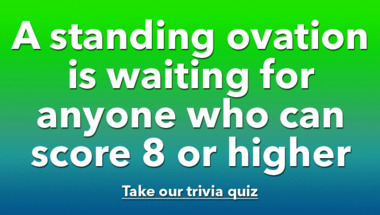
Science questions (10 questi
Mixed questions
Mixed questions
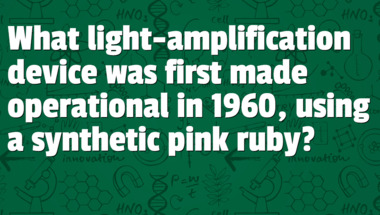
10-question general knowledg
How many questions will you ace in this 10-qu..
How many questions will you ace in this 10-qu..

Advertisement
Beatles Quiz
How many of them will you answer correctly?
How many of them will you answer correctly?
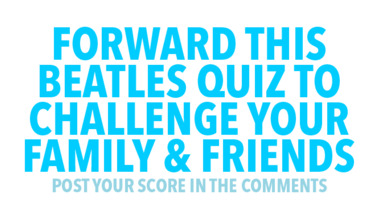
General trivia quiz
10 mixed questions
10 mixed questions

..ooOOoo.. Trivia Quiz ..ooO
How big is your brain?
How big is your brain?

1960s History Quiz (Super Ha
Goal : Score 4 out of 10
Goal : Score 4 out of 10

10 questions in mixed trivia
How many correct answers will you get?
How many correct answers will you get?
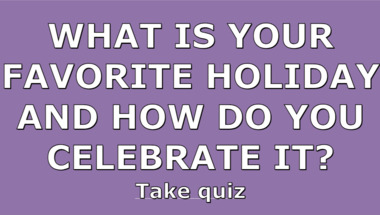
Medicine Trivia Quiz
Level : VERY HARD
Level : VERY HARD

Crazy hard trivia quiz
Are you the genius for this quiz?
Are you the genius for this quiz?

General Knowledge For Trivia
10 questions to answer
10 questions to answer

General trivia quiz
10 mixed questions
10 mixed questions

Advertisement
General trivia quiz
10 mixed questions
10 mixed questions

Trivia quiz for 60+
10 questions about mixed knowledge
10 questions about mixed knowledge

History Quiz
How many correct answers will you get?
How many correct answers will you get?

10-question brain teaser cha
How many questions will you ace in this 10-ro..
How many questions will you ace in this 10-ro..

10 quite impossible science
Are you ready? :)
Are you ready? :)

Brainy Trivia Quiz
10 questions in mixed categories
10 questions in mixed categories

10 trivia questions in a qui
Are you up for the challenge?
Are you up for the challenge?

10 mixed category trivia que
10 mixed questions for you to have fun with
10 mixed questions for you to have fun with

Mixed Trivia Questions
Post your score in the comments!
Post your score in the comments!

Advertisement
History Quiz
10 mixed questions
10 mixed questions

How smart are you?
10 questions trivia quiz
10 questions trivia quiz

Quiz : What did kids watch o
10 questions to test your knowledge
10 questions to test your knowledge

Trivia quiz for clever owls
10 questions in different categories
10 questions in different categories

Trivia Quiz
10 questions
10 questions
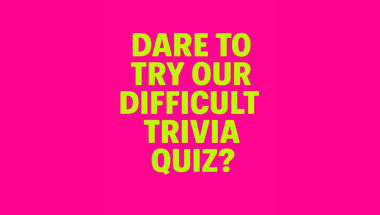
Movie Trivia Quiz
10 fun questions
10 fun questions

Trivia Quiz : General Knowle
10 quite impossible questions
10 quite impossible questions
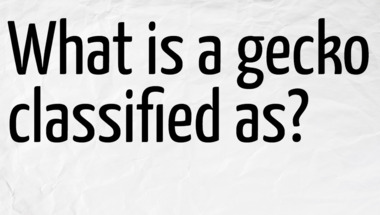
Science & Nature Quiz
10 Trivia Questions
10 Trivia Questions

Quite hard quiz with 10 triv
Click here to take the quiz
Click here to take the quiz

Advertisement
Food/Cooking Quiz
10 interesting questions
10 interesting questions

A quiz about old sayings, pr
10 fun questions
10 fun questions
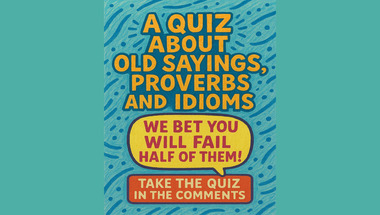
Amusing trivia quiz
10 fun and challenging questions
10 fun and challenging questions

Trivia quiz for people who a
Are you a knowledge genius?
Are you a knowledge genius?

History Trivia Quiz
10 questions
10 questions

1960s song quiz
How many do you remember?
How many do you remember?
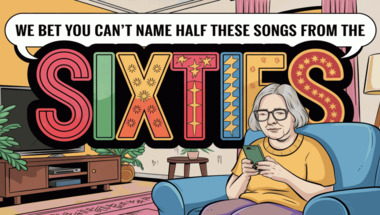
Geography Trivia Quiz
How's your trivia brain doing?
How's your trivia brain doing?

Quiz : Spanish Words
Can you translate these 10 Spanish words?
Can you translate these 10 Spanish words?

10 General Knowledge Questio
Tell us your result in the comments
Tell us your result in the comments

Advertisement
Geography Quiz
10 mixed questions
10 mixed questions

Trivia Quiz
10 questions
10 questions
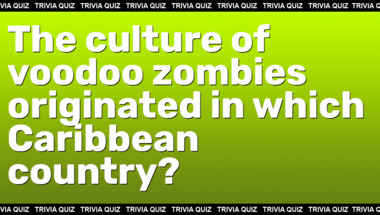
* General Trivia Quiz *
10 questions
10 questions
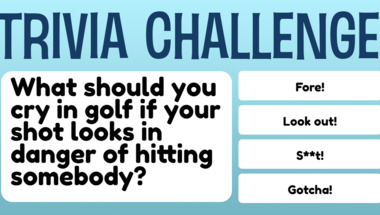
Quiz : We tell you the 1960s
10 bands to guess
10 bands to guess

Genius level general trivia
Do you have the brains to score 8/10 in this ..
Do you have the brains to score 8/10 in this ..
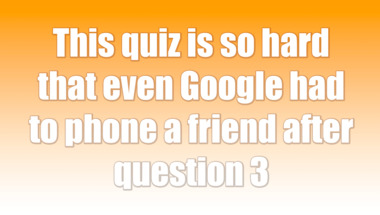
Food/Cooking Quiz
10 interesting questions
10 interesting questions

General Trivia Quiz (10 fun
Try out this fun quick quiz
Try out this fun quick quiz
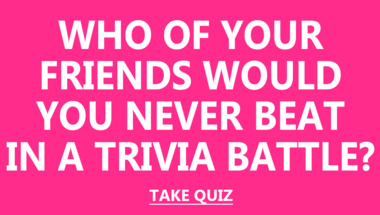
History Quiz
10 mixed questions for you
10 mixed questions for you
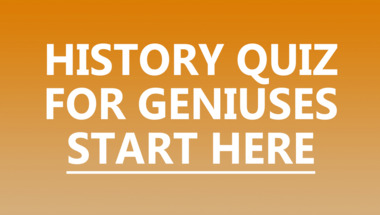
** General Trivia Quiz **
>> 10 mixed questions <<
>> 10 mixed questions <<

Advertisement
General Trivia Quiz
10 mixed questions
10 mixed questions

10 trivia questions in one f
How high will your score be?
How high will your score be?

World Geography Quiz
10 mixed questions for you
10 mixed questions for you

Trivia Quiz for 60+
Ten amazing questions
Ten amazing questions

Quiz about Latin words
Level : extremely hard
Level : extremely hard

Will you be the first to sco
10 trivia questions
10 trivia questions

Back to school quiz
10 questions lined up
10 questions lined up

General Trivia Quiz
How many of them will you answer correctly?
How many of them will you answer correctly?

General Trivia Quiz
10 questions from us to you!
10 questions from us to you!

Advertisement
General Knowledge For Trivia
10 questions to answer
10 questions to answer

General Trivia IQ challenge
Is your IQ high enough for these questions?
Is your IQ high enough for these questions?

Quiz on history.
10 questions to assess your level of understa..
10 questions to assess your level of understa..
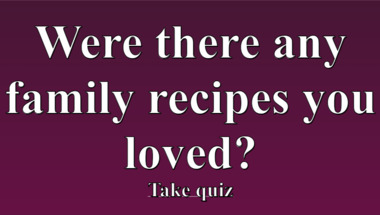
Quiz : What do you know abou
How many correct answers will you get?
How many correct answers will you get?

Quiz of general trivia
10 questions on a variety of topics
10 questions on a variety of topics

Amazing Trivia Quiz
10 hot questions
10 hot questions
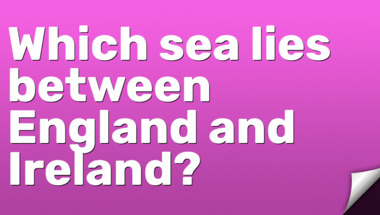
* Trivia Quiz *
* 10 mixed general questions *
* 10 mixed general questions *

General Trivia Quiz
10 questions to answer
10 questions to answer
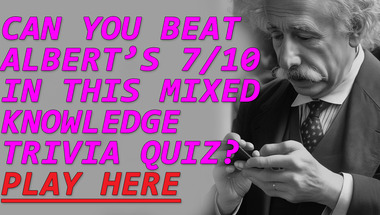
Film Trivia Quiz
Can you score all the correct answers?
Can you score all the correct answers?

Advertisement
Science and nature quiz
10 mixed questions
10 mixed questions

1960s History Quiz
10 fun questions
10 fun questions
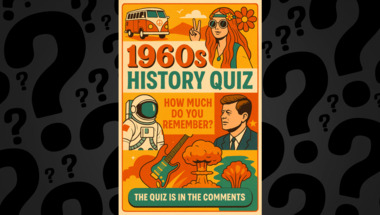
Amazing Trivia Quiz
10 hot questions
10 hot questions
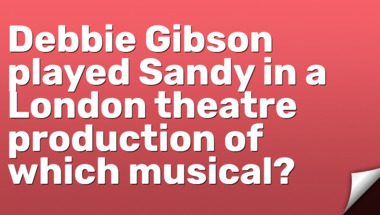
Quiz : 10 songs from the 198
Let us know your score in the comments
Let us know your score in the comments

Trivia Quiz About The Olympi
10 Quite Difficult Questions
10 Quite Difficult Questions

General trivia quiz
Do you have it in you?
Do you have it in you?

Trivia Quiz. America versus
5 questions about each nation
5 questions about each nation

10 trivia questions in a qui
Are you up for the challenge?
Are you up for the challenge?
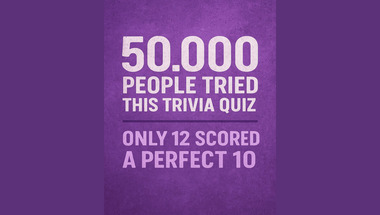
Mixed knowledge questions
10 questions in mixed categories
10 questions in mixed categories
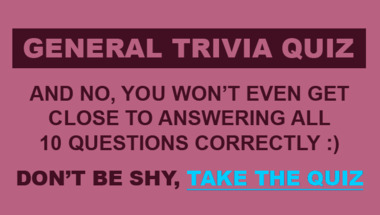
Advertisement
10 mixed general trivia ques
Fun quiz. Play now
Fun quiz. Play now

Trivia Quiz
10 questions to test your knowledge
10 questions to test your knowledge

Quiz : Lyrics of the seventi
How many of these songs do you remember?
How many of these songs do you remember?

10-question blast from the p
How many questions will you ace in this 10-qu..
How many questions will you ace in this 10-qu..

History Quiz
10 mixed questions
10 mixed questions
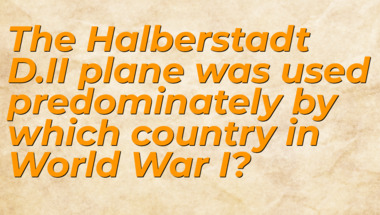
General Trivia Quiz with 10
Can you score 7 or higher in this one?
Can you score 7 or higher in this one?
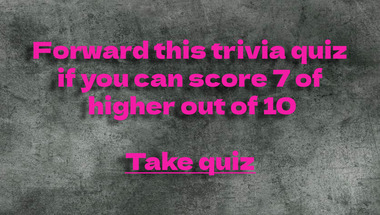
* Trivia Quiz *
* 10 mixed general questions *
* 10 mixed general questions *
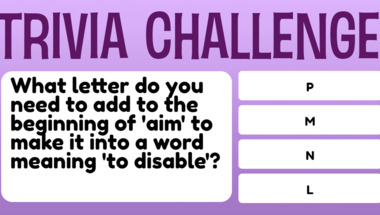
General Mixed Trivia Quiz
10 fun questions
10 fun questions

10-question challenge: Test
How many questions will you ace in this 10-qu..
How many questions will you ace in this 10-qu..

Advertisement
Expert Trivia Quiz
Level = Super Hard
Level = Super Hard

General Knowledge For Trivia
Let us know your score in the comments
Let us know your score in the comments

Mixed general trivia quiz
10 fun questions
10 fun questions

Quiz : We removed a word fro
Can you help us find the missing words?
Can you help us find the missing words?
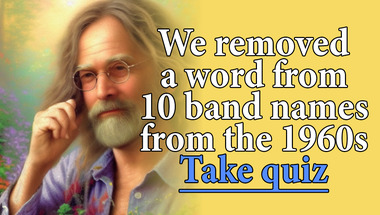
Test Your General Knowledge
Answer these 10 fun trivia questions
Answer these 10 fun trivia questions

10-question global quiz chal
How many questions will you ace in this 10-qu..
How many questions will you ace in this 10-qu..
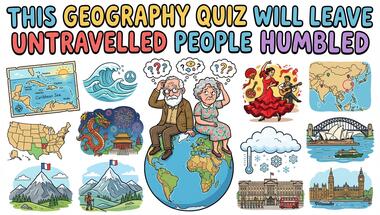
Ten-question quiz covering a
How many questions will you ace in this 10-qu..
How many questions will you ace in this 10-qu..

World History Quiz
10 questions to test your knowledge
10 questions to test your knowledge

1970s Song Quiz
How many songs do you know?
How many songs do you know?
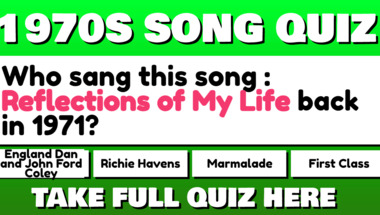
Advertisement
1960s Bands Quiz : "What did
The 1960s was an amazing decade. Do you have ..
The 1960s was an amazing decade. Do you have ..

Beatles Lyrics Quiz : Ob-La-
Can you answer all 10 questions?
Can you answer all 10 questions?
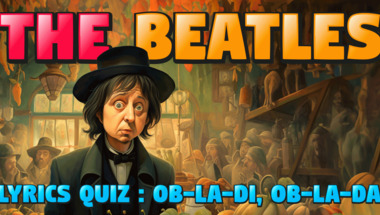
1960s Song Quiz
Can you help us out here? :)
Can you help us out here? :)

Quiz on General Trivia
10 questions covering a variety of topics
10 questions covering a variety of topics

10 mixed categories question
How smart are you really?
How smart are you really?

General Trivia IQ challenge
Is your IQ high enough for these questions?
Is your IQ high enough for these questions?
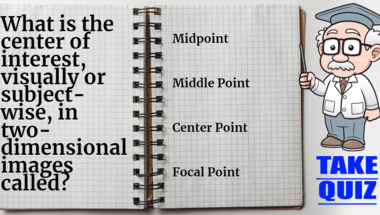
Trivia Quiz for smart people
10 mixed up questions in a range of categorie..
10 mixed up questions in a range of categorie..

Quiz : Bingo calls
Do you know which number top of the shop is?
Do you know which number top of the shop is?

Trivia quiz covering assorte
10 questions with mixed topics
10 questions with mixed topics

Advertisement
Hard Trivia Quiz
Will you even get 5 questions right?
Will you even get 5 questions right?
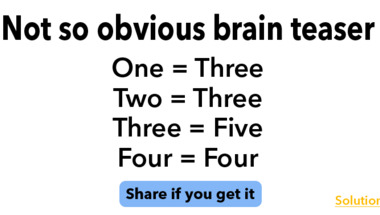
10-question brain teaser (ge
How many questions will you ace in this 10-qu..
How many questions will you ace in this 10-qu..

Quiz : Do you know French?
Can you translate these 10 French words?
Can you translate these 10 French words?

General trivia quiz
10 mixed fun questions
10 mixed fun questions
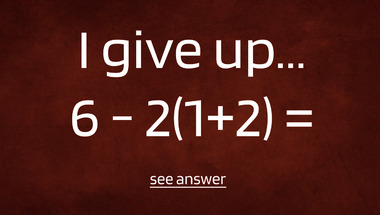
Quiz : Songs of the 1980s
Let us know your score in the comments
Let us know your score in the comments

Expert level trivia quiz
Your goal is to score 5/10
Your goal is to score 5/10

Trivia Quiz
10 questions to test your knowledge
10 questions to test your knowledge

General trivia quiz
How smart are you really?
How smart are you really?

Trivia Quiz + Answer to ridd
How many correct will you get?
How many correct will you get?

Advertisement
General Knowledge Quiz
10 mixed questions to have fun with
10 mixed questions to have fun with

Test your knowledge with the
Share your score in this entertaining mixed s..
Share your score in this entertaining mixed s..

10-question fun facts challe
How many questions will you ace in this 10-qu..
How many questions will you ace in this 10-qu..
